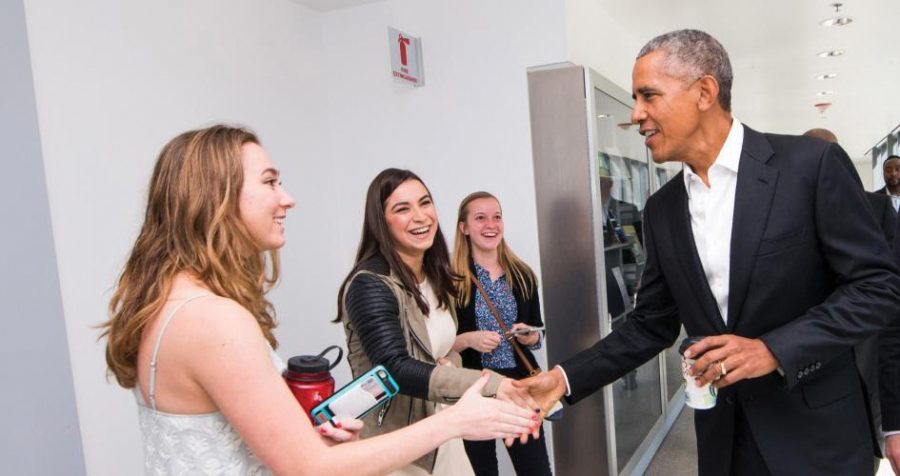Advocacy Corps gives students opportunities to work for local advocacy groups
Members of the Advocacy Corps meet former president Barack Obama in spring 2017. The Advocacy Corps presents students with the opportunity to meet local and national advocates.
November 25, 2018
Students have taken the opportunity to become advocates for local justice organizations through the Advocacy Corps, a two-quarter program offered through Northwestern’s Office of Student Engagement.
The program — which takes place during the Winter and Spring Quarters — teaches students how to become effective advocates, then sends them off to local advocacy groups in the area to work on projects centered around various social justice issues. These issues can include everything from women’s reproductive rights to affordable housing policy, according to the program’s website.
Gwyn Hodges, one of this year’s student facilitators, remembers working with the Chicago Appleseed Fund for Justice last year, interviewing people affected by court fees. The Weinberg sophomore also learned how to lobby and build coalitions with multiple organizations through the program.
“We help students engage in discussion and discourse in certain topics,” Hodges said, “such as organizing certain ideas about community organizing, what it means to be an effective advocate and identifying people within an organization that would be a target for certain advocacy campaigns.”
The program typically has about 25 students per year, said Weinberg senior Che Anderson Justice, a facilitator who has been with the program since its in the Fall 2016 inception. This year, Anderson Justice said the program has eight student facilitators who help organize work with local advocacy groups.
The Advocacy Corps has changed since its first program two years ago. According to Anderson Justice, previous years have consisted of lecture-style meetings, and the students were responsible for finding and volunteering for their own local organizations. This year, the Advocacy Corps plans to find organizations beforehand for the students.
“A really big goal for this year is to have students be able to really get involved in their projects from the beginning,” Anderson Justice said. “I think that will be a lot more engaging and a lot more exciting to start with.”
While students learn how to become effective advocators through Advocacy Corps, some students use the skills they learn in leadership positions on campus. Weinberg senior Madisen Hursey said she used the skills she learned in the program in her role as co-president of the NU Quest Scholars.
“In a leadership position it’s really important to know how to talk to people and know how to influence people and organize people in a meaningful way around a topic that you care about,” Hursey said.
The Advocacy Corps also gave Hursey an opportunity to meet other agents for change, from State Sen. Daniel Biss (D-Evanston) to David Axelrod, the former chief strategist for Barack Obama.
For Anderson Justice, though, one of the Advocacy Corps’ most important roles is as an off-campus advocacy coordinator.
“We have a lot of groups on campus that do on-campus advocacy or we have a lot of groups on campus that engage in dialogue around social issues,” Anderson Justice said. “Those groups are all really wonderful and really important, but I feel what makes our program unique is that we really help people learn about the advocacy issues on a basic level and give them the confidence to pursue advocacy off campus.”
Email: [email protected]
Twitter: @emmaeedmund


